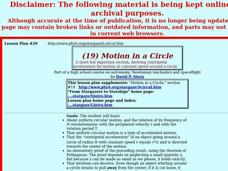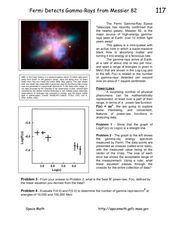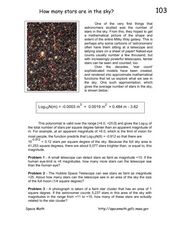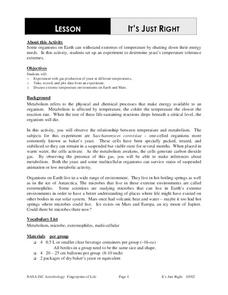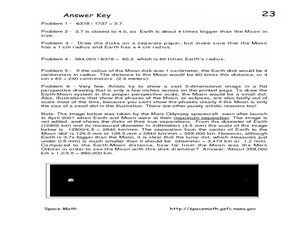Curated OER
Thermo and Fluid Dynamics of a Homemade "Lava Lamp"
Learners construct their own lava lamp using simple substances. In this physics lesson, students explain how difference in density causes convection. They solve for forces and buoyancy using mathematical equations.
Curated OER
WAVES AND PHOTONS
Learners examine the many types of electromagnetic waves, the concept of an EM wave, how James Clerk Maxwell proposed a slight modification of the equations of electricity, Heinrich Hertz and his radio-frequency, wavelengths, and light...
Curated OER
The Many Faces of Energy
In this energy worksheet, students are given a table of the many measurements of energy. They solve 6 problems converting from one measurement of energy to another using the conversion factors given.
Curated OER
MOTION IN A CIRCLE
Young scholars explore uniform circular motion, and the relation of its frequency of N revolutions/sec with the peripheral velocity v and with the rotation period T, and the "centripetal acceleration" of an object.
Curated OER
Hubble Spies Colliding Asteroids!
In this colliding asteroids worksheet, students are given the equation to determine the collision time for asteroids. Students use this equation to solve 4 problems including finding the area of a cross-section through the body of an...
Curated OER
Areas and Probabilities
For this area and probability worksheet, high schoolers solve 5 problems where they find the probability of an event occurring. They also use a given photograph of the moon's surface to find the area covered by craters and determine the...
Curated OER
Auroras
In this aurora worksheet, students read a description of an aurora observed by Captain Standard in 1859. Students interpret the description with a drawing giving as much detail as possible using colored media to capture what they read.
Curated OER
Fermi Detects Gamma-Rays from Messier
In this power law function worksheet, learners use data from the Fermi Gamma-Ray Space telescope to apply the power law function to physical phenomena. Students use a graph to solve four problems.
Curated OER
How Many Stars are in the Sky?
For this star count worksheet, students solve three problems using a given polynomial and its logarithm to determine the number of stars in a given area.
Curated OER
Areology-The Study of Mars
Students examine core samples from Mars and discover what they can use it to tell the history of Mars. In this core sample lesson students create and analyze their own core samples then eat them at the end.
Curated OER
Creature Feature
Students make detailed observations and identify an unknown using descriptions. In this observation lesson students are given a creature and must be able to identify it by species and genus.
Curated OER
It's Just Right
Young scholars conduct an experiment to determine the temperature tolerance of yeasts. In this biology lesson plan, students collect data and compare them by plotting graphs. They explain how extreme temperatures affect organisms.
Curated OER
Impact Craters: Holes in the Ground!
Middle schoolers simulate crater formation through a lab activity. In this space science lesson, students calculate how much energy is transferred during meteorite impact. They identify different factors affecting the size and depth of...
Curated OER
Follow the Falling Meteorite
Students use triangulation method to locate meteorite landing site on the map. In this earth science lesson, students participate in a meteorite treasure hunt set up by the teacher. They explain how this method is used by scientists to...
Curated OER
A Bird's Eye View Of Your Community
Students locate and identify their community by using a satellite image from the Internet. Students locate and identify common land structures within their community. You may want to include structures such as roads/streets, houses and...
Curated OER
Blame It On El Nino
Learners understand what the weather phenomenon El Nino is and what causes it. Students recognize how remote sensing technology can detect and predict El Nino. Learners discover how El Nino effects weather conditions throughout the globe...
Curated OER
MASS
Students distinguish between weight and mass. They examine how in oscillations of a mass against an elastic spring--in the absence of gravity, or in horizontal motion--the length of the oscillation period is proportional to the square...
Curated OER
FRAMES OF REFERENCE: THE BASICS
Students examine the concept of frames of reference in physics: that two frames of reference, each moving with respect to the other with a constant velocity v, observe the same accelerations and therefore Newton's laws are the same in both.
Curated OER
Is There Water on Mars?
Young scholars decide whether or not there is or has even been water on Mars. They analyze temperature and pressure data from the Pathfinder mission to Mars, and then they analyze images of Mars, interpreting the landforms they see and...
Curated OER
Modeling Hot and Cold Planets
Students, in teams, design and construct models of two planets, one hot and the other cold, using a variety of materials. They attempt to create the models out of substances that will actually show the greatest temperature differences...
Curated OER
Volcanoes are a Blast-Working with Simple Equations
For this projectile motion worksheet, high schoolers solve 3 problems and an inquiry problem using three equations that describe projectile motion. One equation is for the maximum velocity to reach a height, H, the other is the maximum...
Curated OER
Measuring Star Temperatures
In this measuring star temperatures, students find the temperature of a star using Planck's curve and the Wein Displacement law. Students also find the peak wavelengths for given stars using Planck's curve.
Curated OER
Rotation Velocity of a Galaxy
In this orbit of stars in galaxies worksheet, students are given an equation that models the orbital speeds of stars as they relate to their distance from the nucleus of a galaxy. Students solve 5 problems using this equation and...
Curated OER
The Earth and Moon to Scale
For this Earth and Moon worksheet, students find the ratio of the Earth's radius to the Moon's radius, they compare the diameter of the Earth and Moon, they create paper models to scale of the Earth and Moon and they compare Earth-Moon...





